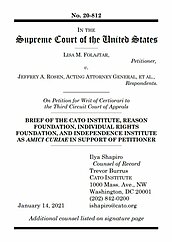Learn more about Cato’s Amicus Briefs Program.
Lisa Folajtar pled guilty in 2011 to federal tax fraud, a felony, which is punishable by up to three years’ imprisonment. She was sentenced to three years’ probation, including three months of home confinement. She also permanently lost her right to keep and bear arms.
According to federal law, a person convicted of a “a crime punishable by imprisonment for a term exceeding one year” is prohibited from possessing any firearm or ammunition. Folajtar wants to obtain firearms and ammunition to defend herself and her family within their home as well as a Federal Firearms License for Archery Addictions, LTD, a Pennsylvania corporation of which she is president.
She filed suit in federal court challenging the law as it applied to her, arguing that her Second Amendment rights should not have been stripped because she did not pose a threat to public safety. A divided panel of the 3rd Circuit rejected her constitutional challenge. The majority endorsed a test used by several federal appeals courts which limits the Second Amendment to “virtuous” citizens—citizens who have not committed a serious criminal offense. The Court concluded that Congress’s designation of her offense as a felony indicated that Folajtar’s offense was serious.
Writing in dissent, Judge Stephanos Bibas insisted that the majority was wrong for the “extreme deference that gives legislatures unreviewable power to manipulate the Second Amendment by choosing a label.” For Judge Bibas, the historical limits on the Second Amendment only justify stripping Second Amendment rights from those who “pose a serious danger to the public.” Since Folajtar does not pose a danger, she should be able to possess a gun.
Cato, joined by the Reason Foundation, the Individual Rights Foundation, and the Independence Institute, has filed an amicus brief to urge the Supreme Court to review Folajtar’s case. We ask the Court to treat the Second Amendment with the same respect that it gives to individual rights such as the First and Fourth Amendment. Currently, some lower courts use a collective rights test to determine the scope of the Second Amendment, even though the Supreme Court announced that the Second Amendment is an individual right. Collective rights, such as voting and serving on a jury, require citizens to act as part of a collective enterprise. Since the right to self-defense is individually held, courts should not use the same test they use for collective rights.
Looking at the felony label is a poor test to determine the seriousness of an offense as it is vague and manipulable. While looking at the maximum punishment of a crime gives a sense for the crime’s seriousness, it treats all offenders the same without engaging in meaningful review. Moreover, legislatures possess the power to define the scope of the Second Amendment as courts defer to how legislatures label an offense. In an era of overcriminalization, this means that millions of individual’s rights to self-defense will be unconstitutionally removed. The Court should overrule the Third Circuit, clarifying that the Second Amendment only allows the disarmament of those who pose a danger to society.

This work is licensed under a Creative Commons Attribution-NonCommercial-ShareAlike 4.0 International License.



